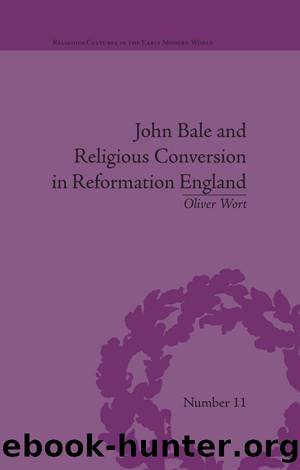John Bale and Religious Conversion in Reformation England by Oliver Wort

Author:Oliver Wort [Wort, Oliver]
Language: eng
Format: epub
Tags: History, General, Europe, Great Britain
ISBN: 9781317319962
Google: OoVECgAAQBAJ
Publisher: Routledge
Published: 2015-10-06T16:11:06+00:00
âSpeke ye to me â¦?â âWhat wolde ye with me?â âWhat is the matter?â Though Catholicus claims to be very eager to speak with Hereticus â âI have ben a great whyle, very desirous to talke with theâ, he says â still the addressed is left oblivious as to why this might be.13 There is humour here, but given what was oft en at stake when contrary religious opinions encountered one another in the early sixteenth century, we should perhaps be on our guard. John Heywoodâs comedy The Pardoner and the Frere, which was printed in 1533, can act as our guide on the matter. The verbal struggle Heywood stages between his two representatives of religion results in mud-slinging, in name-calling, in accusations of heresy, and these escalate into a physical violence that not only overwhelms the playâs figures of authority â the local parson or curate, and his parishioner âNeybour Pratteâ â but also promises to recur: âadew, to the devyll, tyll we come agaynâ, the fractious pair vow.14 Apparently disorder is the natural and inevitable result of religious dispute, which is maybe why the teasing to-and-fro of Gwynnethâs Catholicus gives way to something more serious. The still ignorant Hereticus is astonished that Catholicus âshold be so desyrous, to talkeâ with him and presumes a case of mistaken identity, â[f]or I suppose ye knowe me notâ. Catholicusâs response is anything but reassuring: âyes well ynough, by syghte and here sayâ.15 Readers who spot âheresyâ in Catholicusâs âhearsayâ can guess where this dialogue might be leading.
How well we know ourselves and others, and how much better others know us, are chief concerns of Gwynnethâs work, particularly as these relate to religious identity. Although a response to the martyr John Frithâs rejection of transubstantiation, A Boke Made by John Frith Prisoner in the Tower of London Answeringe unto M Mores Lettur which He Wrote agenst the First Little Treatyse that John Frith Made (1533), Gwynnethâs work was prompted more particularly by a concern that not infrequently this âmost notable and wylye heretyke Frythâ was being praised for his âlernynge and myche gentylnesses ⦠[for his] very syngulare and great pacyenceâ.16 Inexplicably, Gwynneth thought, âsome not onely praysed and commended, but also pytied and lamented [him] ⦠for his dew and just punishment corporall ⦠as though he had ben a man utterly cast away without causeâ. Given the disparity between Frithâs fate, his condemnation and immolation as a heretic, and his reputation among some, Gwynneth determined to discover the truth regarding Frithâs heresy or otherwise. This he did by taking up a copy of Frithâs book and reading it, so that he âmyght perfytly perceyve, ye very hole cause of hys worthy dethâ. What he discovered on reading, and rereading, was âthe tortuouse and croked wylynesse of an heretykeâ.17
It is only in the last twelve chapters of the text, though, that Gwynneth sets about demolishing Frithâs beliefs on the Eucharist; the rest of the work is instead given over to an
Download
This site does not store any files on its server. We only index and link to content provided by other sites. Please contact the content providers to delete copyright contents if any and email us, we'll remove relevant links or contents immediately.
Fanny Burney by Claire Harman(26594)
Empire of the Sikhs by Patwant Singh(23070)
Out of India by Michael Foss(16846)
Leonardo da Vinci by Walter Isaacson(13315)
Small Great Things by Jodi Picoult(7118)
The Six Wives Of Henry VIII (WOMEN IN HISTORY) by Fraser Antonia(5496)
The Wind in My Hair by Masih Alinejad(5086)
A Higher Loyalty: Truth, Lies, and Leadership by James Comey(4948)
The Crown by Robert Lacey(4805)
The Lonely City by Olivia Laing(4798)
Millionaire: The Philanderer, Gambler, and Duelist Who Invented Modern Finance by Janet Gleeson(4464)
The Iron Duke by The Iron Duke(4349)
Papillon (English) by Henri Charrière(4258)
Sticky Fingers by Joe Hagan(4188)
Joan of Arc by Mary Gordon(4099)
Alive: The Story of the Andes Survivors by Piers Paul Read(4017)
Stalin by Stephen Kotkin(3956)
Aleister Crowley: The Biography by Tobias Churton(3628)
Ants Among Elephants by Sujatha Gidla(3459)
